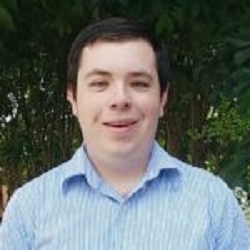
Scott Yeudall was awarded an NIH F30 individual predoctoral Ruth L. Kirschstein National Research Service Award from the National Heart, Lung and Blood Institute in July of 2021. Scott is an MSTP students who pursued his PhD training with Dr. Norbert Leitinger in the Department of Pharmacology. He defended his dissertation in May of 2022 and was awarded his PhD in Pharmacology in August. Scott’s research focused on macrophages, the innate immune cells responsible for pathogen surveillance and clearance, clearance of dead or dying cells, and tissue repair. A growing body of literature over the past two decades has demonstrated that macrophages have a remarkable ability to rewire their cellular metabolism in response to external signals and intracellular states, and that this metabolic reprogramming is critical for successful completion of their many functions. Scott’s fellowship project was focused on understanding the macrophage response to heme, a common physiologic source of both oxidative stress and inflammation which drives pathology in conditions such as Sickle Cell Disease (SCD), sepsis, and intravascular hemolysis. Specifically, he sought to understand how macrophages adapt intracellular glucose utilization in response to heme exposure, with the hope of shifting the balance between aerobic glycolysis, which is associated with heme-induced inflammation, and the pentose phosphate pathway, which promotes a cell-protective antioxidant response and heme clearance. Scott used in vitro metabolic and inflammatory assays, in vivo models of SCD and intravascular hemolysis, combined with analysis of patient-derived gene expression and plasma marker data to address these problems. When asked what motivates his scientific pursuits, Scott noted that the immune system is a fascinating and yet fickle beast, which must operate within the finest of margins – achieving a sufficient level of activation to efficiently remove pathogens and damaged cells, but without becoming overactive to the point of damaging healthy tissue or driving uncontrollable levels of inflammation. He is interested in the processes and signals that tip the balance of immune cell activation from a level that promotes homeostasis into a proinflammatory, hyperactive state, with a particular focus on the role of cellular metabolism. By understanding how immune cells fine tune their responses to the diverse stimuli they see in settings of both homeostatic function and hyperactivation, he hopes to identify therapeutic avenues for treatment of prolonged tissue inflammation in the setting of injury or infection, hyperinflammation, and autoimmune disease. As a trainee in UVA’s Medical Scientist Training Program, Scott’s near-term goals are to pursue research residency training in Internal Medicine with a strong research fellowship. His ultimate goal is to lead an independent research group asking translationally-relevant questions about the interplay between metabolism and inflammation in both normal function and pathologic dysfunction of the immune system, integrating basic benchwork discoveries into translatable patient care applications.
